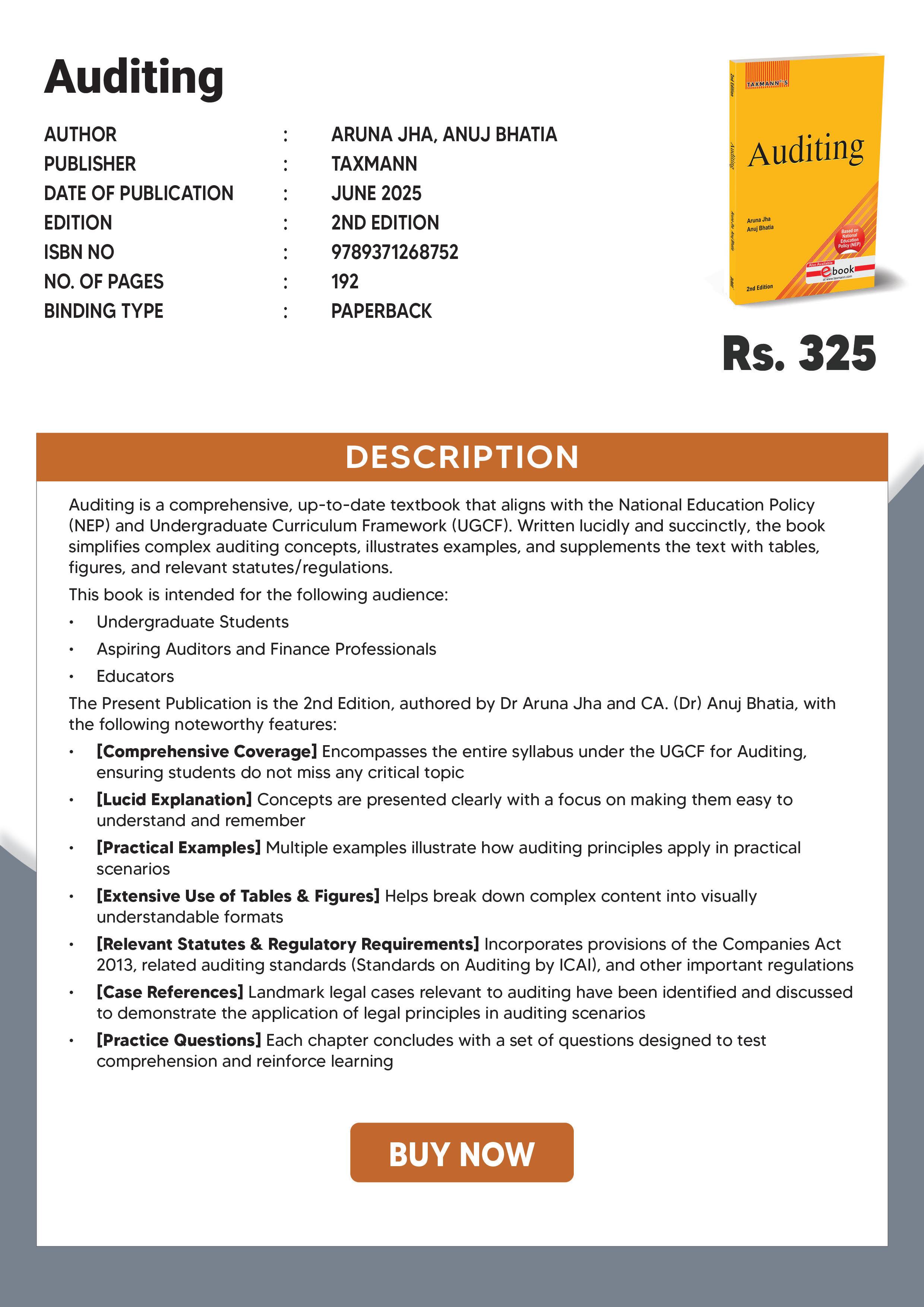

2.1
3.3
5.1
6.6
6.8
Chapter 7
7.1
7.2
7.3
7.5
7.6
7.7
7.8
7.9
Chapter
8.1
8.8
Chapter 9
9.1
Chapter 10
Chapter 11
Chapter
Chapter
Chapter 14
14.7
15.1
15.2
15.3
15.4
15.5
15.6
15.7








2.1
3.3
5.1
6.6
6.8
7.1
7.2
7.3
7.5
7.6
7.7
7.8
7.9
Chapter
8.1
8.8
Chapter 9
9.1
Chapter 10
Chapter 11
Chapter
Chapter
Chapter 14
14.7
15.1
15.2
15.3
15.4
15.5
15.6
15.7







The National Financial Reporting Authority (NFRA) is established by the Government of India under section 132(1) of the Companies Act, 2013. NFRA is a regulatory body and its main purpose is to oversee the compliance with standards of accounting and auditing to enhance the credibility and reliability of financial reporting in India. Rule 4(1) of the NFRA Rules, 2018 states that NFRA shall protect the interest of investors, creditors, public and other stakeholders by establishment of accounting and auditing standards of high standards and effective oversight of financial reporting by companies and the work of auditing by the auditors.
The Chartered Accountants Act, of 1949, failed to maintain discipline and accountability among Chartered Accountancy professionals due to self-regulation. The Standing Committee on Finance-Companies Bill 2009 and the Companies Law Committee Report, 2016, highlighted the need for an independent audit regulator. Colossal Corporate Scams like Yes Bank, DHFL and Satyam happened due to failures of the auditor to identify red flags along with conflicts of interests, further triggered the need of an oversight authority over auditors that is independent of the auditing profession.
The Supreme Court of India, in 2018, in the matter of S. Sukumar v. The Secretary, Institute of Chartered Accountants of India & Ors., suggested the Union Government to consider appropriate legislation for auditor oversight, similar to the Sarbanes-Oxley Act, 2002 and Dodd Frank Wall Street Reform and Consumer Protection Act, 2010 in the US. In line with the global trends, the National Financial Reporting Authority (NFRA) was proposed to be established with the enactment of the Companies Act, 2013. The NFRA replaced the National Advisory Committee on Accounting Standards (NACAS) under the erstwhile Companies Act, 1956. Even though the Companies Act, 2013 was implemented from 1st April, 2014, NFRA was established in October, 2018. NFRA has been modelled on the lines of Public Company Accounting Oversight Board (PCAOB) in USA.
NFRA is the primary watchdog for accounting and auditing practices, oversight of compliance with accounting and auditing standards and handling cases of serious misconduct. As per section 132(2) of the Companies Act, 2013 and NFRA Rules, 2018, the powers, functions and duties of NFRA are:
(
i) To have an advisory role: NFRA recommends the accounting and auditing standards and policies to be adopted by the companies with the approval of the Central Government. During year 2022-23, NFRA reviewed and approved a total of four (4) proposals of ICAI for amendments in Ind ASs pursuant to amendments in corresponding IFRS Standards.
(
ii) To oversee the quality of audit services: NFRA is auditor of auditors. NFRA is given the responsibility of Audit Quality Review (AQR). The primary objective of the AQR is to examine the quality control system of the audit firm and to determine how well it complies with auditing standards. NFRA has the power to go for audit firm-wide quality inspections and for this purpose it can conduct a review of the quality control policy of audit firm, perform test check of the quality control processes, and also do test check of audit engagements undertaken by the audit firm/ auditor during the year. During December 2022 and January 2023, five large audit firms were inspected, involving audit reports of twenty-five clients.
(
iii) Monitoring: NFRA monitors and enforces the compliance of accounting and auditing standards by the companies through various means. One of the important tools is do this is Financial Reporting Quality Review Reports (FRQRs). It is an important tool to assess and evaluate whether the information presented in the Financial Statements meets the key requirements for presentation and disclosure and also to provide guidance to the companies on how to improve the quality and transparency of financial reporting, in order to comply with the accounting standards as stipulated by law.
(
iv) Investigative Powers: The NFRA has the power to investigate the professional misconduct of any auditor or auditing firm or any other professional(s) for any misconduct committed. In a recent case four auditors of DHFL branches were investigated for professional misconduct and punishment was meted to them by NFRA. National Company Law Appellate Tribunal dismissed their plea that only ICAI has the authority to take disciplinary action against them. Further, it said that if NFRA starts investigating any case, no other institution has the power to continue or initiate any parallel proceeding
(
v) Disciplinary Powers: NFRA may impose penalties or even debar auditors or auditing firms if found guilty of professional misconduct. As on 31st March 2023, a total of 74 disciplinary cases are in progress at various stages of the disciplinary process.
Para 11.5 NATIONAL FINANCIAL REPORTING AUTHORITY (NFRA) 128
(vi) Incidental Functions: NFRA may also perform any such functions or duties that may be necessary to perform the above functions.
As per the rule 3 of NFRA Rules, 2018, the provisions of NFRA will be applicable to the following classes of companies and auditors thereof:
(
i) the companies that are listed on any stock exchange in India or abroad;
(ii) unlisted companies having any of the following as on 31st March of immediately preceding financial year:
(
a) paid-up capital of Rs. 500 crores or more; or
(b) annual turnover of Rs. 1,000 crores or more; or
(
c) debt (aggregate of outstanding loans, debentures and deposits) of Rs. 500 crores or more.
(iii) companies governed by special Act like banking companies, insurance companies, electricity companies.
(
iv) any company or class of body corporates recommended by the Central Government to NFRA in the public interest.
(
v) subsidiaries of any Indian companies registered outside India, if the income or net worth of the subsidiary company exceeds twenty per cent of total income or net worth of the holding company.
NFRA consist of the following members appointed by the Central Government:
(i) A Chairperson
The chairperson should be a person of eminence, integrity and standing and have an ability, expertise and experience of at least 25 years in the field of accounting, auditing, law and finance.
(ii) Three Full-Time Members
A full-time member shall be a person of integrity and standing and should have an experience of at least 20 years in the field of accounting, auditing, law and finance.
(iii) Nine Part-Time Members
A part-time member should be a person who does not have any financial or other interest which may affect his functions as a part-time member prejudicially.
The following persons shall be appointed as part-time members of NFRA:
(
(
(
(
(
(
(
(
a) One member from the Ministry of Corporate Affairs (MCA), not below the rank of Joint Secretary, ex-officio;
b) One member representing the Comptroller and Auditor General (CAG) of India not below the rank of Accountant General or Principal Director, ex-officio;
c) One member representing the Reserve Bank of India (RBI) not below the rank of Executive Director, ex-officio;
d) One member representing the Securities and Exchange Board of India (SEBI) not below the rank of Executive Director, ex-officio;
e) President of the ICAI, ex-officio;
f) Chairperson of the Accounting Standards Board of the ICAI, ex-officio;
g) Chairperson of the Auditing and Assurance Standards Board of the ICAI, ex-officio; and
h) Two experts from the field of accounting, auditing, law and finance. Chairman and full-time members of the NFRA manage the NFRA’s executive functions. Besides implementing the authority’s policies, they ensure compliance with its regulations and oversee day-to-day operations. The executive body also oversees the NFRA’s administrative functions and manages its staff.
The establishment of NFRA marked a major change in the regulatory landscape of accounting and auditing in India. ICAI is a statutory body established under the Chartered Accountants Act, 1949 primarily to regulate the Chartered Accountants (CAs), setting of accounting and auditing standards and providing professional education still has an important role to play.
11.6-1
The establishment of NFRA has brought about significant changes in the accounting and auditing practices.
(a) Increased Accountability: Stringent oversight and disciplinary actions have forced auditors to be more accountable.
(b) Enhanced Audit Quality: Regular oversight, inspections and quality review by NFRA have led to improvements in the quality of audits.
(c) Transparency: NFRA mandates to publish the reports of inspections and enforcement actions have led to transparency and increase of trust in the financial reporting. 129
(
a) Setting accounting and auditing standards: The role of ICAI in setting standards (though the recommendations go through NFRA) and regulating the profession still remains crucial.
(
b) Maintaining a code of ethics: The ICAI is also responsible for maintaining a code of ethics for the profession. The ICAI still regulates the compliance in the entities and the conduct of auditors which falls outside the jurisdiction of NFRA.
(
c) Providing education and training: The ICAI core strength remains in providing education and training, while NFRA deals with misconducts, investigations and disciplinary actions.
After the separation of roles of NFRA and ICAI, the collaboration between both the bodies is crucial for maintaining the integrity of the accounting and auditing practices in India and enhancing the quality of financial reporting.
1. What is the National Financial Reporting Authority (NFRA), and why was it established?
2. Evaluate the impact of NFRA on the audit profession in India.
3. Explain the role of NFRA in enhancing the credibility and reliability of financial reporting in India and thus, improving investor confidence.
4. Write a note on the governance structures within the NFRA?
5. An investigation by Serious Fraud Investigation Office (SFIO) in the affairs of a listed Company X has revealed that the company and its group companies had presented financial statements containing false statements of debtors and indulged in the malpractice resulting in inflated purchases and sales. Which regulatory authority, established under the Companies Act, 2013 may SFIO approach to initiate action against Company X? Explain the role and powers of this financial regulatory authority. (Delhi University, 2023, 2024)
